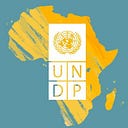Ghana boosts farming productivity
Solar-powered irrigation helps increase income and yields
Imagine having to walk 12 kilometers daily to a small plot of land, to produce enough food to feed your family…Iddrisu Aboubakar, a farmer in the northern region of Ghana, has been doing this for 13 years.
Because Northern Ghana is much drier than the South, Iddrisu and his colleague farmers also faced the bigger challenge of irrigating their crops during the dry season. To farm all year round, they had to rely on petrol-powered pumps, which they said was expensive and made farming unprofitable.
“Life was unbearable, and taking care of a family of ten while living with my father a challenge. ” — Iddrisu.
Now Iddrisu’s story is very different. With UNDP support in partnership with the Energy Commission of Ghana and NewEnergy, a local NGO, solar-powered irrigation pumps were provided to farmers from 4 localities in Northern Ghana to irrigate their crops all year-round, resulting in increased yields.
The initiative is not only providing more income, but it is also helping improve the nutrition of the famers’ households.
“I now make enough money from the sales of my crops for my family to eat vegetables and fruits from my farm.” — Iddrisu.
The pumps are capable of watering up to a total of 15 hectares of land and deliver up to 1 million litres of water each day. The project also provided drip irrigation demonstration kits, that help the farmers use water more efficiently and expand the irrigation area.
“The constant supply of water from the solar-powered pumps offers me the prospect to harvest at least three times each year instead of once,” says Hawa, a vegetable farmer. “This means increased income, food and improved nutrition for my household. With this, I can support my children’s education.”
With assistance from NewEnergy, the farmers also established good relationships with purchasers who buy their farm produce. They each contribute an average of $2.5 monthly to a cooperative fund to ensure proper maintenance of the equipment and maintain capital for future investment.
Today, Iddrisu boasts a two and half-acre farm plot, with various crops such as cabbage, okro, tomatoes, pepper and banana, which he harvests 3 times in a year. Proceeds from his farming activities helped him build a home and move out of his father’s house.
He also bought a motorbike, which makes the daily 12 km journey much easier.
The SE4ALL initiative initiated by the former UN Secretary-General, Ban Ki-moon, aims to ensure universal access to modern energy services; double the global rate of improvement in energy efficiency; and double the share of renewable energy in the global energy mix, by 2030.
Ghana was one of the first countries to embark on the initiative, launching a SE4ALL Action Plan in June 2012. Besides the provision of the solar-powered irrigation facilities, the initiative also led to the development of standards for improved cookstoves, and the development of an energy access toolkit to provide data on energy sources.
The project introduced the annual Ghana Renewable Energy Fair, which offers a platform for stakeholders to discuss the challenges and opportunities in the renewable energy sector and showcases public and private interventions in the sector.
Text and photos by Praise Nutakor/UNDP Ghana
